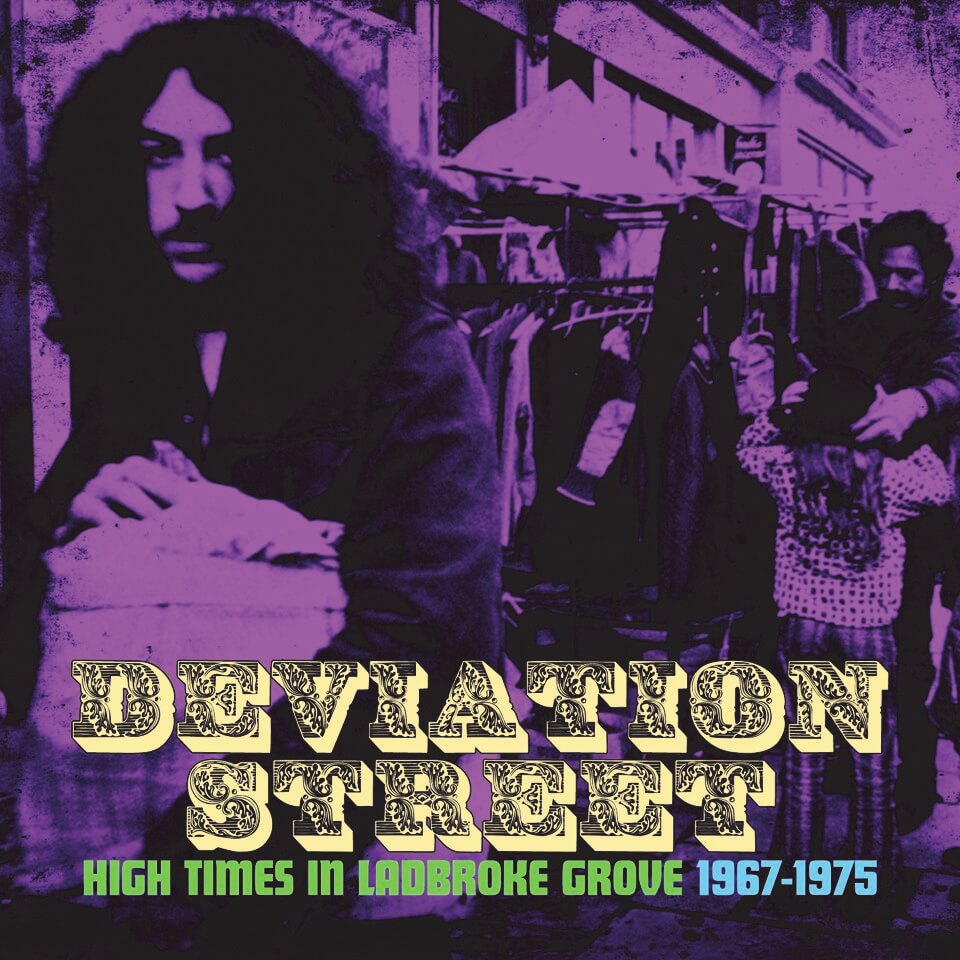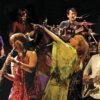In 1966 Timothy Leary said that we should “Turn on, tune in and drop out”. The American psychologist and author known for his strong advocacy on the use of psychedelic drugs was to become a pied piper for creatives, hippies, drop-outs, and many more and was something that was to become a feeding phrase for many years that followed. Of course, musicians would experiment with the use of drugs, that bands such as The Beatles had done so was no secret, the playful elements on albums such as Sgt Pepper’s Lonely Hearts Club Band might lay claim to this. In San Francisco, The Haight-Ashbury underground scene would become known as somewhere this culture would flourish. Here in the UK, it was London’s Ladbroke Grove that took this ethos on board, and here is where we find ourselves as we absorb the sounds on Deviation Street, High Times In Ladbroke Grove.
Ladbroke Grove in the 60s rang with the sounds of counter-culture and saw many artists gravitate to these hallowed streets. First to be served on this collection are Quintessence and the first of two tracks offered by the band. Just a stone’s throw from this Royal Borough of Kensington and Chelsea is their 1969 single ‘Notting Hill Gate’ which starts with the words “Things look great in Notting Hill Gate…” and I don’t think even the greenest lyricist would miss that lyrical connection. This is a band that plays psychedelic rock, mixed with jazz, influenced by the sounds of India, and is just wild. Filled with riffs, whose sway we can hear in sounds today, with a bass run that lives on. These were a 6-piece that featured Raja Ram, an Australian-born musician, and owner of record label Tip World, who also wields a mean flute. If you’re stuck for a contemporary reference, think Herbie Mann, the revered American jazz flautist, or perhaps the solo performed on Gil Scott-Heron’s ‘The Revolution Will Not Be Televised’, as all artists involved make their instruments sing. Early in this collection, you will feel just where these musicians are heading, with words offered by vocalist Shiva Shankar Jones, “…we all sit around and meditate, but only you can know the reason why, oh why we fly in the sky so high, we’re getting it straight in Notting Hill Gate…”, a line followed by that wild flute solo from Ram. What comes next is another passage of rock history, as Hawkwind Zoo, play ‘Hurry On Sundown’. This is a number that includes a rhythm offered by vocalist Dave Brock’s 12-string guitar and is a lesson in music, from John Harrison’s bass run, and Terry Ollis’s wild and obscure drums, to a riff that has itself learned a lot from the Indian subcontinent.
I love the feel of the tracks that I’ve heard so far and as I hear Carol Grimes & Delivery present ‘Blind To Your Light’ I’m left feeling no different. Grimes, the British singer/songwriter was with Delivery for just one album, her gravely vocals sitting perfectly with the soulful, jazz-infused rock offered here. She sings “…Groping in the dark, trying to find a switch to the light. Thought I saw the way clearly, but my eyes just don’t see right. Stumbling along, feeling bad, making it worse, feeling sad…”. A number perhaps describes the wrong side of a trip, but together with the music, brings the audience along and makes this feeling not quite so bad. Next is a band a few decades ago, I became hooked on, these are Tomorrow. English to their core, they featured guitarist Steve Howe who would later make his name in the band Yes. Here they present not a single, but the final track on their debut album, as ‘Hallucinations’ makes its arrival. Their brand of psychedelic rock, touched by freakbeat would see John Peel induct them into his ‘Perfumed Garden’ late-night show on the British pirate radio station, Radio London, which featured musicians who were to be central figures in the English psychedelic movement. Commercial success eluded them, but in the 90s, this was a sound that saw a resurgence. They are definitely a band worth adding to your playlist. This number is strangely isolating in sound production, but whose instrumentation is certainly out there.
Bodast’s ‘Black Leather Gloves’ is next to trip off this playlist and another band guitarist Steve Howe had involvement with. This song is a simply written collection of 5 chords, which have been put together in such a compelling way, that along with vocals from bassist Dave Curtiss, make this a prog-rock winner, so much so I’m hooked. He sings “…Black leather gloves on the inner wall of our igloo make our body cold. If the toothpaste turns black too, then the reaper is able to complete his stage in evolution…”, I love the imagery, whatever it means. This is an exercise in progressive songwriting, the hook has been well and truly flavoured and taken me under its spell. I thought I was to venture down Deviation Street in Ladbroke Grove’s musical history, instead, I find myself travelling far deeper than the few minutes from the Tube station. Having journeyed down the rabbit hole, I have become lost in its many barres. Quite aptly the wonderful ‘Subway (Smokey Pokey World)’ by The Tickle follows. A track during which they mention “…sitting under a rubber soul…”, a reference used for The Beatles’ 1965 album and was a way of referencing music with its own place, compared to anything that had come before. The clockwork precision of Village’s ‘Long Time Coming’, is a number which sends me back to my visit to Portmeirion’s Village, the location of the bizarre 60s TV drama The Prisoner. This instrumental features the keyboard mastery of Peter Bardens, with Bruce Thomas, the future bassist with Elvis Costello. From the appropriately titled band, this was 2 and a half minutes of spaced-out keys. Village was a short-lived project and Peter’s place in history was a veritable who’s-who in music. Further, into the collection Bardens’ solo work can be heard on the track ‘The Answer’, during which his keyboard skill combines with an equally epic guitar solo by German guitarist, Andy Gee.
Stray leads disc 2 with ‘All In Your Mind’, an impressive, but slightly generic example of prog-rock. High Tide follows with what appears to be the use of a vocoder on ‘Blankman Cries Again’ on an engaging journey. This is one that might raise a smile, both musically and as vocalist Tony Hill uses what might have been influenced by the storyline of a J. R. R. Tolkien novel. Harpsichord introduces Steamhammer’s ’Turn Around’, as this collection continues to exemplify its progressive abilities. Just as Peter Bardens shows instrumental abilities on Village’s ‘Long Time Coming’, Davey Graham & Holly provide another demonstration of how to supply an instrumental on ‘Afta’. Here, Graham presents this in rhythmical form, chords are played, but these become at one with the rhythm. Using a fingerstyle form of acoustic guitar, he became an inspiration to many of his contemporaries and is one of the best-known acoustic blues-folk guitar pieces ever composed. At 3 minutes and 21 seconds, this is absorbing and worth it’s place. More recognised artists are Hawkwind having dropped the Zoo, in 1971 they released the album In Search of Space on which ‘We Took The Wrong Step Years Ago’ is found. Featuring the twelve-string guitar of founding and only remaining member Dave Brock, the lyrics bemoan the direction of society, “Look around and see the warnings close at hand, Already weeds are writing their scriptures in the sand. We took the wrong step years ago, we took the wrong step years ago…” and that was in 1971. The same year saw Marc Bolan perform with his band Tyrannosaurus Rex, ‘Rings Of Fortune’ and as the piece starts, you can hear Bolan refer to another psychedelic heavyweight, Jefferson Airplane, adding a link to San Francisco’s Haight-Ashbury underground scene. Other artists include the 12-bar blues of The Deviants ‘Slum Lord’ or Ram John Holders ‘Notting Hill Eviction Blues’, illustrating that be it a burning climate or issues relating to poverty, are subjects that are as seasoned today as they were in 1968, despite legislation that should’ve addressed them. The connections here are vast, some examples being Larry Wallis, guitarist of The Pink Fairies, whose ‘Uncle Harry’s Last Freak-Out’ rounds off disc 2 and was to become an early member of Motörhead. Or the band’s multi-instrumentalist Steve Peregrin Took, who after performing with The Pink Fairies, would join Marc Bolan in Tyrannosaurus Rex and these are just a few.
Disc 3 starts with Junior’s Eyes ‘Circus Days’, the trippy sounds of Trees ‘Nothing Special’, as well as The Aquarian Age and ’10,000 Words In A Cardboard Box’, with its familiar structure and augmented chords, epitomise an age that although many will be unfamiliar with, will still feel at home. The recognisable voice of Bryan Ferry can be heard on Roxy Music’s ‘2HB’. This is a stripped-back performance that many accustomed to later Roxy Music may find odd, but with Ferry’s vocals, their mainstay is still identifiable. Later on, Motörhead demonstrates the vocal strength of Lemmy Kilmister as ‘Lost Johnny’ hears the familiar voice performed to his solid bass line. The words show “…Can you get the Morphine. Try to be so brief. Lost Johnny’s out there, looking for relief…”, just some of the drug references sung here and by this rock stalwart are very believable. What follows is The 101’ers ‘Silent Telephone’, as Joe Strummer plays to a rock n roll beat and sings the line “…Standing by a silent telephone, me and bakerlite all alone…”, suggesting a time long before mobile phones became an everyday possession. But it’s not all rock n roll, as the sound familiar to a blaxploitation movie rings out, with Mataya Clifford’s ‘I’m A Free Man’. He sings that “…he can stay home, bake some cakes, make some love…”, because he’s a “…free man…”. From this Zimbabwe-born artist, having relocated to London this was a statement of intent, as the Ladbroke Grove scene proved somewhere creativity was a right. A further dive into psychedelia draws our journey to a close, as the second track by The Deviants turns up. Suitably ‘Deviation Street’ is a hilarious dip into the seedier side of west London. This 8’53” number tells of drug dealers, sex shops, voyeurs, and dirty old men and is a tale from a London unrecognisable today. A post-war town, where far more was visible and regulation was yet to catch up with life. A track where even though the faders reduce at five and a half minutes, these are brought up again shortly after providing more entertainment, as you can groove to the spiritual meaning of the patterns on your wall. Now that’s some trip. 3CDs and nearly 4 hours of music, this is one rabbit hole I can fully recommend. A set brought along with a 46-page colour booklet that might offer further clarification, just don’t get lost.




